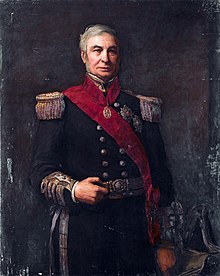Sir Alexander Milne Bt, GCB | |
|---|---|
 Portrait of Milne by Walter William Ouless (1879) | |
| Born | 10 November 1806 Inveresk, Scotland |
| Died | 29 December 1896 (aged 90) Inveresk, Scotland |
| Allegiance | |
| Service/ | |
| Years of service | 1817–1876 |
| Rank | Admiral of the Fleet |
| Commands | HMS Crocodile HMS Cleopatra HMS Caledonia HMS St Vincent North America and West Indies Station Mediterranean Fleet |
| Battles/wars | Crimean War |
| Awards | Knight Grand Cross of the Order of the Bath (military division) Knight Commander of the Order of the Bath (civil division) Milne baronetcy |
Admiral of the Fleet Sir Alexander Milne, 1st Baronet, GCB (10 November 1806 – 29 December 1896), was a Royal Navy officer. As a captain on the North America and West Indies Station he was employed capturing slave-traders and carrying out fishery protection duties. He served as a Junior Naval Lord under both Liberal and Conservative administrations and was put in charge of organising British and French transports during the Crimean War. He became Commander-in-Chief, North America and West Indies Station and in this role he acted with diplomacy, especially in response to the Trent Affair on 8 November 1861 during the American Civil War, when USS San Jacinto, commanded by Union Captain Charles Wilkes, intercepted the British mail packet RMS Trent and removed, as contraband of war, two Confederate diplomats, James Mason and John Slidell. He became First Naval Lord in the third Derby–Disraeli ministry in July 1866 and in this role took advantage of the Government's focus on spending reduction to ask fundamental questions about naval strategy. He again became First Naval Lord in the first Gladstone ministry in November 1872, remaining in office under the second Disraeli ministry and identifying the critical need for trade protection at times of war and demanding new cruisers to protect British merchant shipping.